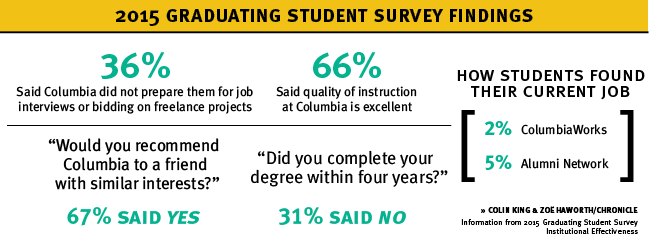Student satisfaction declines among 2015 graduates
Information from 2015 Graduating Student Survey Institutional Effectiveness
September 8, 2015
The office ofInstitutional Effectiveness released a survey of last year’s graduating seniors that showed a decline in student satisfaction from previous years, and the administration said it will announce a package of major initiatives in coming weeks aimed at improving the student experience.
The initiatives have been in the works for months, prompted by the new Strategic Plan, college sources said, adding that the survey results have confirmed the pressing need to move forward on the measures.
The survey, released to graduating students in April 2015, asked a number of questions, ranging from whether students would recommend Columbia to a friend with similar interests to whether the college helped students understand how to launch a career in their industry.
“[What] I will tell you is that the results are statistically significant,” said President and CEO Kwang-Wu Kim on Aug. 19 at the annual Faculty Forum. “This is not just a small subset of our graduating seniors. I think the college has really not created a process to allow your expertise to rise up and push the college to the next level.”
Most notably, the survey reports that only 67 percent of students said they would recommend Columbia to a friend with similar interests—a number which has fallen 10 percent since 2013.
With the Strategic Plan—the college’s five-year improvement plan approved at the end of the Spring 2015 Semester—in place, the college has been planning to focus on several different changes to better support student success and prepare students for their careers, according to Mark Kelly, vice president of Student Success.
The college plans to announce collegewide implementation of other initiatives centered on student success in the next couple of weeks, Kelly said.
“We have been working on this for months, but [the survey] reminds us of why we need [change],” Kelly said. “It tells us that what we said in the Strategic Plan captured something.”
The class of 2015 experienced two administrations and left at a time of great change with the Strategic Plan being approved, which could have resulted in a number of dissatisfied students, Kelly said.
“I believe we are the most important incubator of creative talent in this country, but we have to have that voice in the industry. We don’t right now,” Kelly said. “We made progress. We are going to create new structures to help attend to those issues.”
The survey also showed 66 percent of students found the quality of instruction at Columbia excellent—compared to 74 percent in 2013.
In his Faculty Forum address, Stan Wearden, senior vice president and provost, said the college needs to look at its curriculum and make sure it is offering the best curriculum possible.
“We are admitting a higher caliber student and [these] students have higher expectations,” Wearden said. “There is some reason to expect they are not going to be [as] satisfied as some students were in the past.”
Cara Birch, director of the college’s News Office, said this survey is one of many tools the administration uses to get a picture of the student experience. Not all of the surveys the college administers are available online in full form, however. Getting more robust data that goes into the hard numbers of student success rates, job placements and other experiences at the college needs to be more fully developed, she added.
“It is not about getting better data,” Birch said. “It is about evaluating if this data is the best we can get.”
Jerel Ballard, president of Columbia’s Student Government Association and a senior journalism major, said the SGA plans to work with the administration to make the college more transparent and accessible to improve student satisfaction with the college. He wants the SGA to not only relate to students, but for the college’s administrators to do so as well.
“I believe if we have more dialogue with the administration, these results will definitely [improve],” Ballard said.
He said it is important for the college to continue the survey to capture the true student voice, especially right after graduation. He said it especially helps the SGA to prepare goals for the following academic year.
“We should always be doing better, but what we realized is this is a wonderful place, especially for our graduates,” Kelly said. “The marketplace has changed and we can no longer support our graduates in an ad hoc way, [so] we have to be really organized. We have to have one voice to the industry.”








